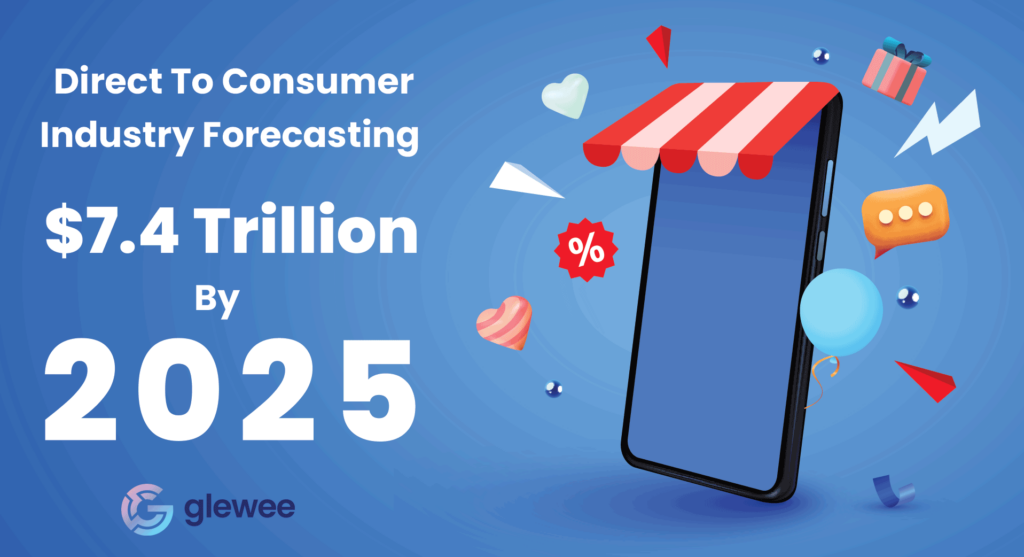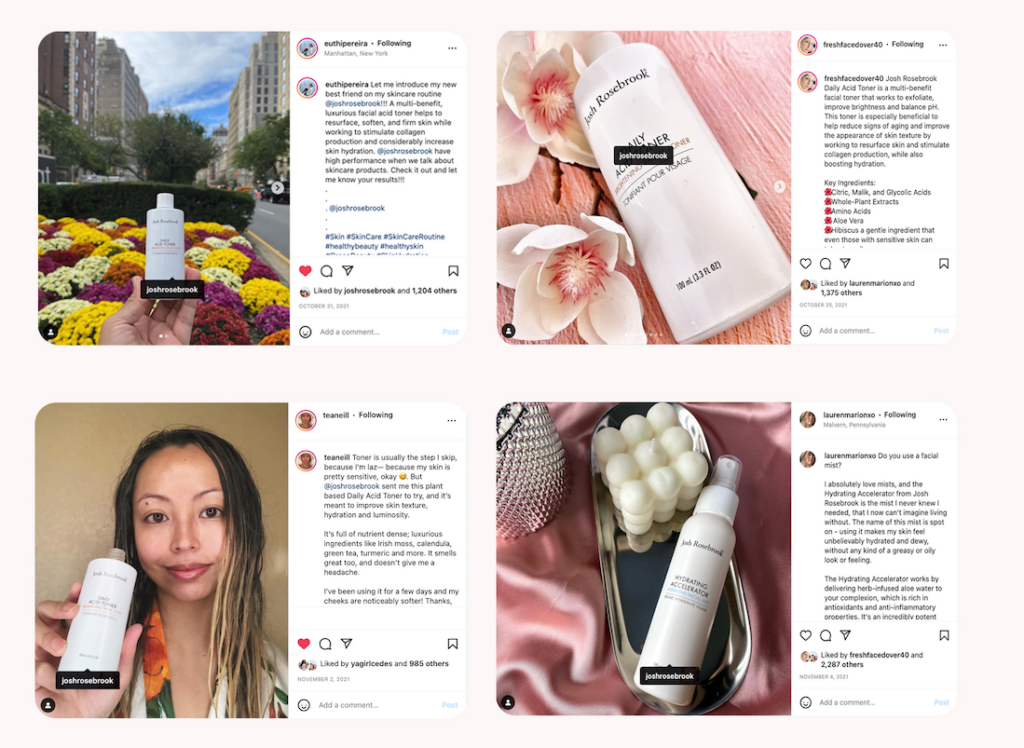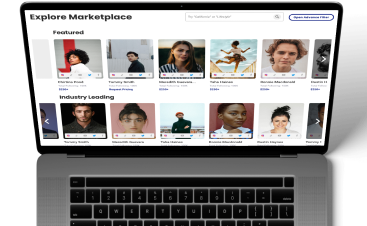Defining Direct-To-Consumer
Direct-to-consumer eCommerce is a business model that bypasses third-party retailers and wholesalers to reach consumers directly. They operate online without the support of intermediates, fulfilling every aspect of the customer experience from sourcing products to coordinating delivery. DTC eCommerce Brands carved a unique position in the virtual marketplace by selling products around which a community of like-valued consumers could gather and connect. The demographics of this community consist largely of millennial and Gen Z shoppers. For any Brand to succeed, it must meet customers where they are. For DTC eCommerce Brands, those customers are almost exclusively online. Connecting with consumers authentically is the key to growing your DTC eCommerce Brand. Growing your Brand means growing the connection between you and the consumer. There is no quicker or more sustainable way to do so than through influencer marketing. This guide will explore the countless ways in which influencer marketing can be used to catalyze DTC eCommerce Brand growth, thereby driving sales and cultivating community.
Table of Contents
- Defining Direct-To-Consumer
- Rising With the Times
- The DNA of DTC eCommerce Brands
- The Double-Tap Touchpoint
- Spread the Word Socially
- Sell a Lifestyle
- Go Local
- Create Shareable Content
- Apply Social Proof
- Curate a Digital Showroom
- Inspire Conversation and Change
- Employ a Data-Driven Creative Strategy
- Make the Most of Each Post
- Value Relationships Above Transactions
- Launch Campaigns With Pre-Vetted Creators
Rising With the Times
Shopping patterns and buying habits shift as rapidly as the times. DTC eCommerce Brands were born in the late 1990s in response to the rise of the internet and consisted of retailers who only sold products online. With digital media on the rise, so was a new wave of DTC eCommerce Brands—those that appealed to millennials. The early 2010s welcomed entrants like Allbirds and Warby Parker onto the digital stage, entrants eager to capture the eyes and hearts of this new audience. When the pandemic struck, DTC eCommerce Brands struck gold again with physical retailers out of the way and DTC eCommerce Brands leading the way.
With the pandemic ending, it’s just the beginning for DTC eCommerce Brands: eCommerce sales are forecast to reach $7.4 trillion by 2025. Moreover, consumers have come to prefer DTC eCommerce as it provides them with personalized and personable exchanges of goods, services, and information. Personalization is amplified by the direct connection between DTC eCommerce Brands and consumers.

The DNA of DTC eCommerce Brands
DTC eCommerce Brands are digital natives and it is only natural for them to want to harness the strengths of influencer marketing. Influencer marketing is so integral to the DTC model that many popular DTC eCommerce Brands today were founded by influencers. Brands like SKIMS by Kim Kardashian and Inamorata by Emily Ratajkowski dominate online channels with their highly consumable and consumed content. Because DTC eCommerce Brands are based online, they must exist on relevant online platforms to establish a community. Users spend over 2 hours per day on social media, so DTC eCommerce Brands have ample opportunity to capture the attention of shoppers globally and daily.
Social media plays an essential role in the development and rise of DTC eCommerce Brands. It is embedded into the structure of DTC eCommerce and woven into its fabric. Without it, DTC eCommerce Brands would be without a sizable audience. With it, DTC eCommerce Brands can grow an audience dramatically.
Glossier’s DTC inception occurred on and because of social media. The Brand began as a blog titled Into the Gloss by founder Emily Weiss during her days at Condé Nast. At only 24, Emily soared to global prominence with Glossier because it talked the talk and looked the look of her generation. Millennials embraced the digital-led brand, its visual expression, and its tagline—“Skin first, makeup second”—as a representation of their online ideals and emerging generational values. Developing a culture before a product is not necessary, but the influence of a shared culture highlights the importance of building community to earn loyalty and sales organically.
The Double-Tap Touchpoint
From Brand activations to having an active presence online, DTC eCommerce Brands can spur change and sales through influencer marketing. Physical retail channels have limited space for Brands and their respective branding. Conversely, digital channels are ever-fruitful and never-ending. Ultimately, it’s not about taking up space, it’s about focusing your offerings in the appropriate online spaces.
Although retail has become a crowded playfield, it is paramount to remember there is a crowd for every DTC eCommerce player. The mobile phone is one of the most powerful touchpoints for DTC eCommerce Brands as it connects them with the consumer wherever they are and enables consumers to transact instantly, even from within a social media post.
In an overly saturated market where products with nearly identical functionality dot the physical and digital walls of storefronts, one of the only distinguishing factors is branding, or how that product is presented to the consumer. Branding transcends the physical product or service to sell something less tangible. That something can be a lifestyle, an identity marker, an aesthetic preference, shared values, or an emotional tie that neatly packages the product as “different” than that of a competitor.
Digital content communicates to the consumer what the Brand represents ethically, visually, and socially. It is an enticing touchpoint that draws people into the DTC Brand narrative and inspires engagement in the form of likes, comments, and shares. With younger generations valuing equity and diversity above all else (and rightfully so) DTC eCommerce Brands can speak to these values by diversifying their Brand spokespersons through influencer marketing. There is an endless sea of Creators in every category with whom DTC eCommerce Brands can partner to make a splash online.
Spread the Word Socially
If your DTC eCommerce Brand is not already known, it’s best to introduce it to younger shoppers through the endorsement of others. 38% of consumers trust brand-created content while 61% trust the recommendation of influencers. Trust cannot be purchased, but influencer-created content can. DTC eCommerce Brands can embed social media marketing into their customer experience to foster current connections and forge new ones. Influencers can be used to not only spread awareness around a DTC eCommerce Brand but around how its products enhance their lifestyle.
TikTok is the favored acquisition channel amongst DTC eCommerce Brands for its large user base—1.05 billion active users—and low advertising costs. Unlike Meta’s platforms and accompanying algorithms, TikTok’s algorithm promotes engaging content free of cost. If your content is good enough, it’s good enough for TikTok to circulate to the right eyes and fingertips free of charge. While paid ads and sponsored content do live on the app, there is still ample opportunity for content to spread and go viral organically.
Clean beauty brand Truly Beauty has built a TikTok following of 2.3M simply by speaking about skincare in simple, transparent terms through the voices of their influencer partners. The DTC eCommerce Brand echoed Gen Z and millennial consumer values by circulating upfront, no-frills content featuring honest commentary, sharing body hair shamelessly, and normalizing real skincare with real Creators.
Phenomena like “TikTok Made Me Buy It” reinforce the natural persuasion an influencer holds when promoting products or services to their followers. Because influencers come with an inbuilt audience, they give DTC eCommerce Brands an automatic in—and that’s an easy win!

Sell a Lifestyle
DTC eCommerce Brands sell more than just products—they sell content. Most involve ambassadors in the form of consumers or influencers when promoting and creating said content. Some go so far as to involve the consumer in the creation of the product itself, imbuing the consumer with a sense of psychological ownership. This was most notably seen with the DTC eCommerce Brand Threadless. The online t-shirt seller involved customers in the design process by allowing them to submit designs and vote on their favorite. The winning design was printed and sold by Threadless only for the process to repeat itself. Their venture was so successful they sold 60,000 t-shirts per month, earning a profit margin that outperformed physical retailers: 35%.
Content sells more than just the products—it sells the experience of the Brand, allowing customers to purchase an identity marker and usable piece of expression. Some DTC eCommerce Brands have even used content in lieu of physical products when production was delayed. DTC luggage retailer Away did so with tremendous success. The Away team decided to release an e-lookbook with influencers who embodied the Brand’s identity. The influencers sold the lifestyle and luggage so well that they went on to become Away ambassadors after the products were launched.
DTC eCommerce Brands use content to reinforce the lifestyle attached to their offerings. They’re more than just purveyors of products, they’re purveyors of an identity. The product becomes just as much about its function as its use as an identity marker. Influencers bring this to life by showcasing the product as it’s meant to be seen: in use. They are selling an achievable fantasy. They are injecting the product with greater value by adding social and cultural value to its market value.
Content is a winning strategy that wins the hearts and likes of the audience. Influencer marketing sells a lifestyle that tends to be more achievable than one hawked through celebrity endorsement. Influencers build their Brands based on being relatable, so if something as simple as buying a product can bring fans closer to them, they will buy the opportunity to do so.
The average DTC eCommerce Brand is strategically priced to appeal to millennials and Gen Z. Their prices are low enough to be more affordable than luxury Brands, but not low enough to be considered budget products. It is a way to appeal to the younger generation’s need for status whilst still being within their range of affordability. To offset the lower price point, DTC eCommerce Brands raise the value of their offerings with higher-quality content.
Go Local
Consumers support localized content and local goods to keep things in the community. Many DTC eCommerce Brands source their products locally, and this can be a major selling point online. Many platforms like TikTok and Instagram push for localized content or services discoverable within your community. As such, DTC eCommerce Brands can increase sales by marketing their products locally. That’s not to say their audience is limited to locals, but it can certainly help heighten their Brand’s authenticity, especially to non-locals. DTC eCommerce Brands can reach international consumers with the right content strategy by nature of being digitally based.
In that regard, virtual content can be virtually everywhere in an instant, connecting consumers across continents who feel connected to a DTC eCommerce Brand and the influencers that promote the Brand. Through authentic influencer marketing, DTC eCommerce Brands can reach consumers who have a rapport with the influencer and align with the Brand’s values. Establishing a deeply personal connection between the Brand and the consumer through influencers creates a bond strong enough to cut across geographical borders and meet the consumers near and far.
Create Shareable Content
Consumers want a Brand they can trust and Brands want growth they can sustain. While scaling a Brand through aggressive advertising may get the word out, it may not always be the most profitable move if done haphazardly. DTC eCommerce Brands can use social media to build relationships with consumers in ways that do not feel forced. By making your DTC eCommerce Brand a source of original and exclusive online content, you strengthen consumers’ trust and confidence in your Brand. Connecting with your audience through consistent and meaningful content sustains relationships, interest, and engagement naturally.
The quality of your content impacts the perception of your DTC eCommerce Brand. Content does not have to be of a higher visual caliber to boost Brand allure, but it has to be of a higher conceptual caliber to spotlight a Brand’s personality. Creating or commissioning content that represents your DTC eCommerce Brand values while providing value for your followers is a surefire way to surge engagement and boost respect. By the nature of sharing likable, on-Brand content, social media users feel compelled to share it too, spreading it like digital wildfire. While not every piece of content is going to go viral, having a consistent and creative content strategy will grab the right attention.
Content that succeeds on social media is content that:
- Prompts a feel-good reaction
- Captures attention
- Unifies your community
- Entertains your audience
- Educates your audience
- Embraces originality
- Supports diversity
- Employs humor
- Resonates emotionally
- Embodies your Brand identity
- Generates thoughtful conversation
- Humanizes the people behind your Brand
- Holds self-expressive value
- Highlights people more than products
The images below are examples of content that influencers created through Glewee for direct to consumer brand in our network. Influencers and creators generate hundreds of pieces of content weekly for D2C brands on Glewee to help drive sales, scale brands, and expand growth.

Apply Social Proof
Social proof is a social and psychological phenomenon that dictates people are influenced by the behavior, choices, and recommendations of others. From word-of-mouth marketing to verified badges, social proof revolves around third-party endorsement to legitimize a Brand’s offerings, reputation, and credibility. DTC eCommerce Brands can harness social proof as part of their growth strategy online. From commissioning user-generated content from Creators to collecting reviews and testimonials from customers, social proof can come in a variety of forms from a variety of real people. Collectively, they all help create a halo effect around your DTC eCommerce Brand, making it inherently more attractive.
By validating your DTC eCommerce Brand, social proof does wonders in the realm of persuasion:
- 81% of consumers trust the word of people above that of Brands
- 72% of consumers find customer reviews to be more credible than Brand reviews
- 69% of consumers have purchased something seen on social media
- 71% of consumers trust influencer-endorsed products or services
- 28% of consumers discover Brands through influencers
- 85% of consumers are more influenced by user-generated content than Brand-generated content
Curate a Digital Showroom
Influencer marketing does not always have to result in sponsored posts—often it can be used to procure content and content alone. TikTok never stops showing your content which means it can go viral at any moment. By working with content Creators to develop original content that is authentic and timeless to your DTC eCommerce Brand, you’re positioning a permanent digital billboard for anyone who sees your page. Although advertising costs have risen, influencer sponsorships and Creator-produced content will almost always fall below the costs of broadcast advertising and studio-produced content.
By housing attractive content on your page, you not only attract customers but other Creators who want to align with your DTC eCommerce Brand and amplify its voice. Influencers embrace direct connections, whether that be through connecting with followers or Brand partners. Recruiting the right-fit influencers to promote your offerings and values is a powerful way to position your Brand before an already engaged audience. Keeping a stream of consistent, engaging content across channels and using multiple links in profile biographies can increase a DTC eCommerce Brand’s web traffic organically.
Inspire Conversation and Change
As mentioned throughout, DTC eCommerce Brands are in direct and constant communication with their customers, taking their feedback to heart and stores. The data acquired drives more than just the evolution of a DTC Brand’s offerings: it also informs its content. Content serves more than just a promotional purpose when it comes to DTC Brand marketing; it serves an inspirational one too. 14% of online consumers defer to DTC Brand pages as a source of inspiration. This highlights how the value of DTC eCommerce Brands surpasses what they sell to include how they sell it. Such content not only reflects our current cultural zeitgeist but holds the power to sway its evolution. Digital content is more sustainable than print and can spread in an instant. DTC eCommerce Brands must create socially aware content that recognizes marginalized communities and fortifies positive messaging.
One notable case of this is Dollar Shave Club. The DTC Brand shaved away the stigma associated with male mental health and well-being by providing their subscribers with editorial content in the form of Mel Magazine, a digital and print endeavor designed to educate men about proper wellness practices from a male perspective. In this instance, Dollar Shave Club connected with its customer base in a highly intimate manner by normalizing a conversation that was rarely discussed. Such content creates social change, stimulates healthy dialogue, and bonds consumers to Brands in ways untold by telling a new story. It is also desired by online shoppers as 28% of them use social media to gain inspiration and buy products.
Employ a Data-Driven Creative Strategy
DTC unicorn Casper exploded online after influencers unboxed their mattresses. Most famous amongst them was Kylie Jenner who shared a Casper mattress with her followers in an Instagram post, breaking the Brand’s website. Her post was so influential it became among the founding factors leading to Casper’s billion-dollar standing today.
Kylie Jenner launched her own DTC Brand in response to the following she garnered and the connection she shared with them. Kylie Cosmetics may be an influencer-led DTC Brand, but it is a DTC Brand nonetheless and one that fully operates around wielding one’s influence in the social media space. As of 2023, Kylie Cosmetics is valued at $1.2 billion.
These numbers are not accidental. They are the result of strategic creative content that’s driven by data and created to drive engagement. Technology is transforming businesses and can guide the growth of DTC eCommerce Brands by measuring the return on investment for each piece of content produced. What is more, thanks to influencer marketing software, metrics are available per post and influencer, helping DTC eCommerce Brands gauge the success of their content marketing efforts. In addition to measuring campaign performance in real time, DTC eCommerce Brands can access metrics like an influencer’s audience insights to determine whether or not the influencer’s followers align with the DTC Brand’s target market. It is a marriage of numbers and creativity to ensure fruitful results that don’t spoil the fun of content creation.

Make the Most of Each Post
Although the cost of advertising and content has risen, Creator-generated content can be acquired at flexible rates, rates that are always more affordable than traditional advertising and creative assets. What is more, Creator-generated content consistently outperforms studio-produced content. If a DTC eCommerce Brands owns the rights to Creator-made content, it can repurpose it to the fullest. Testing a piece of content’s performance across multiple channels can give Brands insight into what converts where and when. For ease of implementation, these tests can be run with software, sparing Brand marketers the added effort. For optimal execution, Brand marketers can monitor the performance of content and Creators using an influencer marketing platform, ensuring everything is managed centrally.
Influencer marketing campaigns are centered around creating and sharing content. Many influencer marketing campaigns do not even involve the Creator in the final output: they only seek to procure Creator or user-generated content for exclusive use by the Brand. Content is content and can live anywhere you would like to house it, whether that be on websites, on social media, in stores, in digital ads, or in marketing brochures. DTC eCommerce Brands can capitalize on this content style and cost to repurpose it wherever appropriate.
Value Relationships Above Transactions
Influencers are people, not a means to an end or modes of distribution. Approaching Brand partnerships from a relational perspective rather than a transactional one will lead to authentic connections and content. By treating influencers as Creators and respecting their authority in their respective domains, DTC eCommerce Brands can glean much more from the relationship and allow for effective and engaging content to come to life. It is paramount to put your personal bias aside when it comes to influencer marketing and trust the Creator when developing your content. Creators may not always know the ins and outs of your Brand, but when it comes to their style of content, they know more than anyone else. Despite this, many DTC eCommerce Brands may not be at ease surrendering creative control to the influencer or Creator. To ensure Brand safety and regulated collaboration, DTC eCommerce Brands can rely on an influencer marketing platform to execute agreements, approve content, and vet the Creator beforehand.
Launch Campaigns With Pre-Vetted Creators
DTC eCommerce Brands often rely on small teams to do big stuff. Technology has undoubtedly augmented many aspects of our lives, and for DTC eCommerce Brands, it was the catalyst that brought them to life. Whether you’re a DTC eCommerce Brand owner or marketer, joining a third-party influencer marketing platform will streamline and elevate your influencer marketing program instantly.
Glewee is one such influencer marketing platform and the #1 choice for DTC eCommerce Brands. Glewee houses over 10,000 pre-vetted Creators across various categories, ensuring your niche and aesthetic are met. What is more, Glewee provides Brands with Audience Insights for every qualifying Creator on the platform. Exclusive to Glewee, Audience Insights help mitigate some of the challenges faced by Brands in the influencer marketing space for they allow Brands to know the audience they are targeting before campaigns are launched. Moreover, Audience Insights enable DTC eCommerce Brands to strategize with data and commission content that will resonate with their target market and the Creator’s followers.
DTC eCommerce Brands can use Glewee to build campaigns, connect with Creators, and measure performance results with an interactive dashboard. Glewee augments and supplements the work of your entire marketing team, streamlining workflow from start to finish with intuitive guidance along the way. Agreements are auto-generated, tax forms are handled by the platform, communication with Creators occurs in real time, and calendars are centralized to ensure due dates are never missed. By regulating the process from a to z, you can navigate campaigns smoothly and with confidence knowing Brand safety is upheld within this digital advertising ecosystem.
Campaigns on Glewee are scalable which means you can customize them to your liking and needs. Whether it’s for Brand activations, user-generated content, one-on-one collaboration, or full-scale sponsorships with multiple Creators, your DTC eCommerce Brand will have access to an endless stream of original content. Content also goes through approval phases before being published, which means nothing is published without your creative stamp of approval or consent. Most importantly, any content created for you on the platform is yours to own—rights and all. Finished content can be accessed with ease through your Content Library and reused across countless channels, maximizing the potential and reach of each piece produced.
Growing your DTC eCommerce Brand is as easy as joining Glewee. Paired with the right Creators, your DTC eCommerce Brand will blossom organically online through partnerships and authentic content created to engage consumers. Lighten your workload with software designed to work for you and Creators who are eager to work with you. From budget-friendly pricing to supportive and friendly experts, Glewee is your go-to influencer marketing platform. With just one app, you can grow sales, Brand awareness, consumer trust, and your content library. We invite you to join the platform and experience impactful influencer marketing firsthand.





